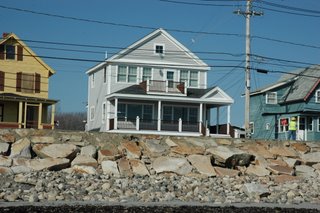
Coming home after two years in the Peace Corps, I arrived at Logan Airport in Boston late in the evening on September 16th and took a limo up to the Beach House. I spent the next couple of weeks just relaxing and trying to prepare for the Foreign Service Oral Assessment that I was scheduled to take in Chicago on October 16th. By 'prepare' I mean, of course, that I would announce once a day that, "I had to begin to get ready for the Oral Assessment". I would then light a cigar, pour a cold drink and sit out on the porch and monitor the Atlantic Ocean for signs of tampering. I looked over the State Department website periodically to get an idea of what I was going to face, then took advantage of the beautiful Fall weather and spent hours each day walking on the beach smoking my cigars. It's not that I didn't care about the OA or that I didn't want to do well, it's just that I couldn't really think of any way to prepare for it. Fortunately, the baseball playoffs were in full swing and football season was under way, so I didn't have to just sit around wasting my time while I was 'preparing'.
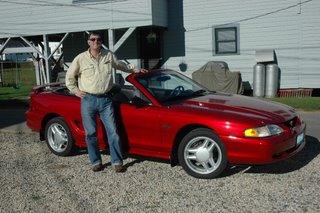
I took my car out of the garage, changed the oil, washed and waxed it and headed off to Chicago about a week before my appointment. I drove across New Hampshire, Vermont and upstate New York on a day when the air was perfectly clear and the leaves were in full Fall color. I listened to book tapes and music and thoroughly enjoyed being back home. The boys and I used to make the 1,000 mile trip from Chicago to Maine in one long eighteen hour shot, but this time I meandered a bit and took three days to get from York Beach to St. Charles. I slept when I was tired and ate when I was hungry. I think it was either Buddha or Elvis who said that this was the mark of the truly free man.
Mari offered to let me sleep on her couch while I was in St. Charles and it was as comfortable as my old bed in Stara Zagora, so I was perfectly happy. On Thursday or so, I remembered that I needed a hotel room in Chicago for Sunday night so I could get to the Assessment bright and early on Monday morning. After spending several hours on the phone, I finally was able to book a room at the Holiday Inn for a mere $400. When I checked in on Sunday, I discovered that the room was on the second floor, directly across from a traffic signal, had no drapes or curtains and a non-flushing toilet. I have no idea what they would have charged me for a decent room! So I did my best to get some sleep in a room that went from red to green to yellow to red to green to yellow to.....all night long.
The Oral Assessment is a day-long, three-part evaluation of an individual's potential to become a successful Foreign Service Officer. Generally, between six and twelve candidates are evaluated on the same day and one of the first things the lead FS Assessor tells them is, "This is a highly competitive process, however, you are not competing against each other. Theoretically, all of you can pass and, unfortunately, it is also possible that none of you may pass". All present are then congratulated for having passed the Written Exam, made to feel quite special and then warned that "most people do not pass the Oral Assessment". You then sign the Non-Disclosure Agreement that prohibits you from discussing the contents (but not the format) of the day, are told to leave cell phones and electronic devices in a locked drawer and are wished "good luck".
All candidates are measured against thirteen 'dimensions' of personality and character identified by the SD as traits common to successful Foreign Service Officers. These are listed on the State Department website and, if you plan to enter the Foreign Service, you would do well to know them cold. The three different exercises that make up the Oral Assessment are designed to allow candidates to demonstrate as many of the thirteen dimensions as possible and it is the candidate's responsibility to do so. The exercises are the Group Exercise, the Structured Interview and the Case Management (or In Basket) Exercise.
On October 16th, there were, including me, twelve hopefuls ready to be assessed. There were eight men and four women, and at least half of us were over or around the age of fifty. We sat in a Candidate's Waiting Room waiting. While we waited, we went around the table and introduced ourselves to each other. There were only three or four of us who hadn't already taken the Oral Assessment and the veterans shared some of their experiences with us. When it was my turn to speak, I mentioned that I was an RPCV from Bulgaria and the man sitting next to me asked, "Koi grad zhiveyash?", or "Where did you live?". It turned out that he had also been in Peace Corps Bulgaria and had left in 2002. Before we had a chance to get too far into the "Do you know...? Were you ever in...?" questions we were split into two groups of six and led out to begin the Group Exercise.
Your group is a committee formed to evaluate several project proposals and offer the Ambassador your recommendations for funding. Each candidate is given a folder of papers, told to study the contents and warned not to discuss anything with the others. Each folder has some common generic country information and some specific project information. You are given thirty minutes to read through your information and to prepare a six minute presentation to the group on your specific project. The objective of the exercise is to reach a consensus on a funding recommendation. When the thirty minutes of prep time is up, four Assessors come into the room and you are told to begin your committee meeting. Each candidate gives his or her presentation and then you try, as a group, to agree on a funding recommendation. You have to advocate for your project but be prepared to withdraw it if it seems that another project has more merit. The Assessors observe the proceedings and grade each candidate according to their level of participation, grasp of the material, leadership, consensus building skills, etc. No extra credit is given for having your project selected for funding and no credit is lost for having your project withdrawn from consideration. When time is up, all materials are collected and the candidates return to the waiting room. The Assessors do not give any feedback to the candidates whatsoever.
I tried to prepare for this by remembering all the committees I've served on and all the groups I've worked with over the years. I'd walk along the beach, puff on my cigar and picture myself guiding the group towards an amicable and intelligent recommendation for our fictitious Ambassador. I wasn't too worried about this part of the day because of my experience. Coincidentally, I'd spent the past year serving on the Peace Corps SPA committee in Bulgaria doing exactly this sort of project evaluation and funding recommendation for real, so I felt that I could handle this role-play exercise without too many difficulties. Unfortunately, when the bell rang I forgot to come out of my corner. I'm not sure what happened but I didn't really participate very much. My six minute presentation was fine, I covered all the major points clearly and concisely in about five minutes and left a minute for questions. I took notes during the other five presentations and identified strengths and weaknesses. However, when it came time to begin choosing projects for funding, I didn't understand the line of reasoning being taken by the other five candidates and couldn't find a way to bring them back into a more realistic line. We ended up funding one project completely and extending partial funding to several others. The partial funding made no sense at all in that we funded things that were useless without the rest of the project. I think my real world experience was actually a handicap and that I came off as argumentative, condescending and uncooperative. Look as hard as you like, you just won't find those three 'dimensions' on the SD list!
After the Group Exercise we were taken back to the waiting room. The next two sections of the Assessment would be the Structured Interview and the Case Management exercise. We were each given an individual schedule for the rest of the day and I was set to take the Structured Interview next.
The Structured Interview was conducted in a small room containing not much more than the chair I sat on, the two Assessors' chairs facing it and a small table between them that they used for their paperwork. The Interview was divided into three twenty minute parts and began with a series of questions used to help determine the candidate's level of experience and motivation. This was my opportunity to explain why I want to join the Foreign Service and why I think I'm qualified to do so. During the second part of the Interview, I was given a series of hypothetical situations and asked to respond to them. This gave me a chance to demonstrate my ability to think quickly and rationally. In the third part of the Interview, I was asked to provide very specific examples from my own experiences to illustrate times when I displayed one or another of the thirteen dimensions. Finally, I was given an opportunity to add anything which I wanted the Assessors to consider that I felt might not have been covered. Again, I was given no feedback whatsoever and was taken back to the Candidate's Waiting Room.
The last exercise of the day was the Case Management exercise. Each candidate is given a binder full of papers, a computer and instructions to follow the written directions in the binder. You have ninety minutes to read through all the material, analyze the data, identify the problem and write a two page memo to your superior offering your summary, evaluations and recommended solution. I hadn't gotten much beyond the first couple of sheets of paper in my binder when the woman next to me and the man across from me began to hammer away at their keyboards. Another candidate had a timer on his watch set to beep every fifteen minutes. I wasted several precious minutes fantasizing doing them all physical harm and then read through the rest of my papers. I wrapped up my memo with a couple of minutes to spare, checked it for spelling and saved it. The Assessor asked us each to print out a copy and that was it. We were finished with the Oral Assessment.
Unlike the Written Exam, the results of the Oral Assessment are given to you that same day. After the last exercise we were given a break and told to return to the Waiting Room in about two hours. Most of us just sat in the Waiting Room and talked through the break. No one discussed the assessment or their feelings about their own chances. When the Assessors were ready, they began calling us out of the Waiting Room individually for our exit interviews. As each candidate returned, they put on a smile, said they'd probably try again next year and left. This pattern continued until there were only two of us left. The lead Assessor came in and asked us both to come with her. We walked into a nearby room and were greeted by the entire group of Assessors who all began shaking our hands and congratulating us! The two of us had passed.
We spent the next hour being fingerprinted and beginning our Security Clearance paperwork. Then we were advised to begin the Medical Clearance process as quickly as possible and given a packet of information on what needed to happen before we could actually be offered jobs. First, we'd need to receive a Class One medical clearance which would allow us to be assigned to any post worldwide. Second, we'd need to receive a Top Secret security clearance. Third, we'd need to receive a Suitability Clearance, which is a final evaluation of a candidate's overall suitability for the position. Failure to obtain any of these three clearances will terminate an applicant's candidacy.
After I receive my clearances, I'll be placed on a Register for the Management track. As the Foreign Service needs to hire people in the Management track, they draw from the Register list and if they get down to my name, I'll be offered a job. I can only stay on the list for eighteen months. If I haven't been offered a job by then, my name comes off the Register and I would have to begin all over again with the Written Exam.
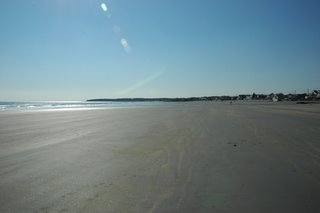
I left Chicago the next day for Maine and made my doctor's appointment for the following Monday. Then it was back to my vigilance in monitoring the ocean. Someone has to make sure the tides are working!
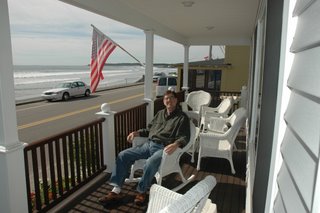
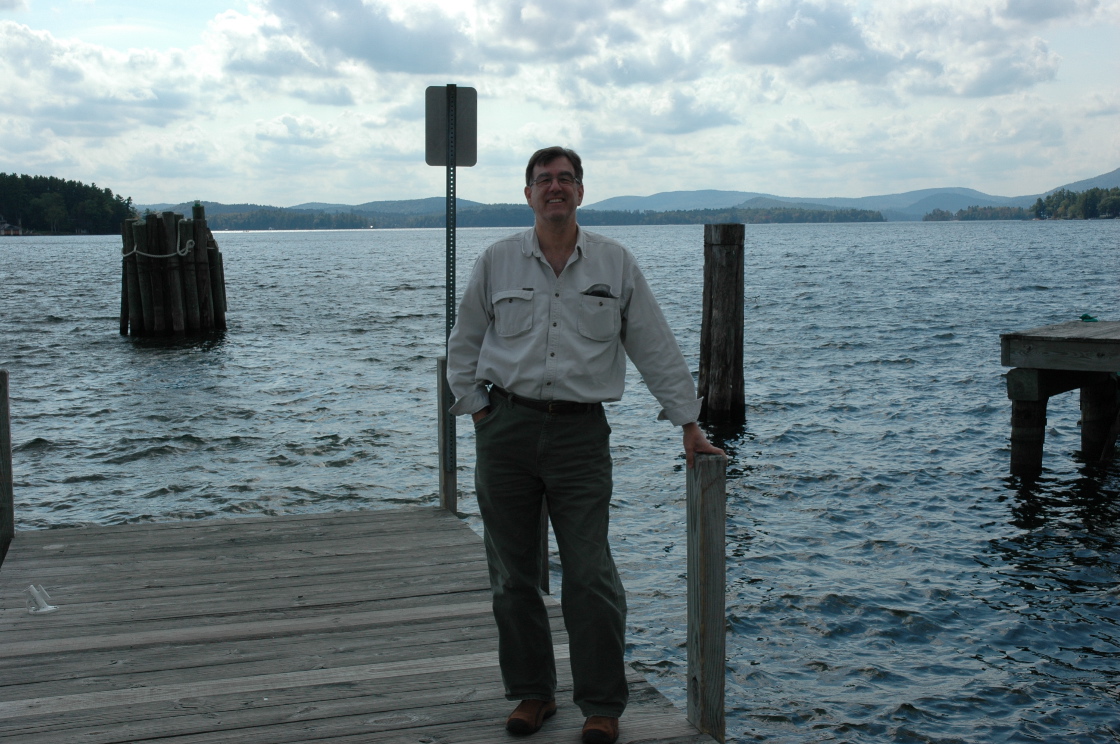
No comments:
Post a Comment